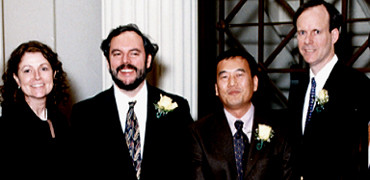
2001 Paul Marks Prize Winners -- From left: Titia de Lange, Stephen J. Elledge, Xiaodong Wang, and William G. Kaelin Jr.
Titia de Lange
Titia de Lange was honored for her discoveries of proteins that bind telomeres, the sections of DNA at the ends of chromosomes. She has described the key components of the protein machinery that maintains the lengths of these chromosomal ends. Loss of these specialized ends can cause chromosomes to stick together in ways that may contribute to cancer.
“Normal cells eventually stop dividing because they lose telomere function and we believe this is part of a tumor-suppressor pathway,” Dr. de Lange says. “Tumor cells have found a way to circumvent this problem by maintaining their telomeres with every cell division. Our next step is to look at how normal cells are alerted when telomeres stop functioning, because this will tell us how the telomere tumor-suppressor pathway works.”
Dr. de Lange is the Leon Hess Professor and head of the Laboratory of Cell Biology and Genetics at The Rockefeller University, New York, New York. She received her PhD degree in biochemistry from the University of Amsterdam and The Netherlands Cancer Institute and was a postdoctoral fellow at the University of California, San Francisco.
Go to Titia de Lange’s Web page at The Rockefeller University.
Stephen J. Elledge
Stephen J. Elledge identified two related but independent systems that have important roles in the cell cycle. One system helps cells sense and respond to DNA damage. This is important because when DNA is damaged, the cell must stop dividing so that the error can be repaired and not be passed on. Cells unable to sense damage are genetically unstable and cancer prone. “My hope is that once we fully understand this damage-recognition pathway, we’ll be able to exploit the vulnerability of cells that don’t have it and develop drug therapies to target those cells,” Dr. Elledge says.
Dr. Elledge also discovered major components of a protein complex that targets other proteins in the cell for degradation. A failure to degrade proteins normally may underlie several diseases, including cancer.
Dr. Elledge is a Howard Hughes Medical Institute Investigator and Professor in the Department of Biochemistry at Baylor College of Medicine in Houston, Texas. He received his PhD degree in biology from Massachusetts Institute of Technology and was a postdoctoral fellow at Stanford University.
William G. Kaelin Jr.
William G. Kaelin Jr. discovered the novel mechanism used by a normal protein, called VHL, to protect against tumors. The VHL protein is abnormal in von Hippel-Lindau disease, which is characterized by a high risk of certain types of cancer, especially kidney cancer.
“This is a rare syndrome but it can teach us a lot about normal human physiology,” Dr. Kaelin says. “As a clinician, I appreciate and understand the unusual features of this disease and I use those features to guide our research.”
The risk arises because VHL normally causes the degradation of another protein, HIF, which stimulates the growth of blood vessels. When VHL is mutated, HIF is not degraded and tumor growth is enhanced by new blood vessels. Dr. Kaelin also has done important work on other proteins that control the cycle of cell division.
Dr. Kaelin is an Associate Professor of Medicine at Harvard Medical School, an Associate Physician at Brigham and Women’s Hospital, and an Attending Physician at Dana-Farber Cancer Institute, in Boston, Massachusetts. He received his MD degree from Duke University School of Medicine and did his internship and residency at Johns Hopkins Hospital. He is also a Howard Hughes Medical Institute Investigator.
Go to William Kaelin’s Web page at Dana-Farber Cancer Institute.
Xiaodong Wang
Xiaodong Wang unveiled a key, previously unsuspected biochemical step in the process of programmed cell death in mammalian cells. A failure to initiate cell death is now recognized as an important cause of some cancers. Dr. Wang showed that mitochondria play a surprising role in the death process by releasing several mitochondrial proteins including cytochrome C, an essential part of the cell’s energy-making machinery.
“We now have a pretty good idea of what signals are involved in programmed cell death,” Dr. Wang says. “What we don’t yet know is how these signals are linked to the mitochondria. That connection is an important one in deciding whether cells live or die, and once we figure it out, it could be a target of future therapies.”
Dr. Wang is the George L. MacGregor Distinguished Chair Professor in Biomedical Science at University of Texas Southwestern Medical Center in Dallas, Texas, and an Assistant Investigator in the Howard Hughes Medical Institute. He received his PhD degree in biochemistry from UT Southwest and did a postdoctoral fellowship there.